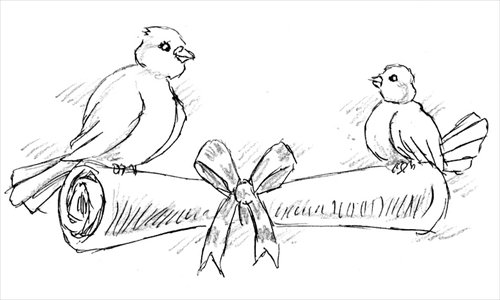Colleges should debate banning teacher-student romance

Illustration: Peter C. Espina/GT
It is human nature to fancy romance stories, be they real or fictional. In works of literature that eulogize the greatness of love, this dearer-than-life sentiment seems to be able to overcome all sorts of problems, including the opposition of feuding families or an unequal social status. But recently, a special kind of romance has met a bit of trouble in China, sparking a heated discussion online.
A professor at the Beijing Institute of Technology, Yan Yiming, raised a debate in the public discourse by arguing that Chinese universities should ban teacher-student relationships, since the lack of regulation is fostering the occurrence of scandals and sexual harassment in this aspect.
Soon netizens, mostly young people, had given the thumbs down to this proposal. Some polls show that 90 percent of online respondents think the proposed ban is a violation of freedom of choice in love affairs. Having faith in free love, they don't believe a relationship between school faculty and students is inappropriate. Laws do not specifically forbid people from the two groups from falling in love. So why bother?
Whether a teacher-student relationship is legitimate depends on different scenarios. If a student is below the age of consent, then any sexual relations between the student and a teacher should be prevented. Besides, even if the student is old enough to consent to sexual acts, it doesn't mean he or she is mature enough to engage in a romance of unequal status. If a young innocent student is seduced by a married teacher, such a relationship will hardly be encouraged by anyone.
The tricky part of the problem is that if a student is old enough and a teacher is not married, and they are attracted to each other, is it OK for them to hook up?
Quite a few esteemed universities in the US have given their answers to the difficult question: No. This February, Harvard approved of a ban on professors having sexual or romantic relationships with undergraduates, labeling such relationships as "inappropriate." Stanford, Yale, The College of William and Mary and a few other universities are also with Harvard. The number of universities prohibiting teacher-student relationships is small, but growing.
Putting aside romance, allowing teacher-student relationships will threaten the justice of education. The unequal power dynamic makes consent hard to determine, gives incentives to abuse of power, and leaves universities vulnerable to allegations of sexual harassment.
The principle of avoidance due to conflict of interest is one of the most important principles of life. It is widely applied in almost all walks of life. Judges need to avoid participating in cases their relatives are involved in. Financial journalists, bound by their employers, cannot buy or sell stocks. However, China's local folk traditions, especially the obsession with the power of flexible "networks," aka guanxi, do not lay much emphasis on the principle.
Thus, teacher-student relationships are basically tolerated by society, with a few celebrity examples to consolidate this tolerance, such as the well-known writer Lu Xun and his wife Xu Guangping.
Still, how to define a teacher-student romance is a controversial problem across the world. But drawing a line to set principles for teachers and their students is for the greater good, even though it is under suspicion of infringement of freedom. But freedom is not born without boundaries. Sometimes, it needs to be compromised for the public good.
Anyhow, the online debate is inspiring. With more exchanges of different ideas and appeals, disagreements might be reversed to become agreements. An open talk before any real decisions are made will bring real benefits to the wisdom of the public.
The author is an editor with the Global Times. liuzhun@globaltimes.com.cn